Main drive question
How can pervasively collected bio-signals be used to support better diagnostics, therapeutics and improve the quality of life?
Answer
- Addressing new manners to collect, fuse and present bio-signals, allowing for the extraction of meaningful information.
- Exploring new feature extraction techniques.
- Developing predictive algorithms for health and well-being.
- Developing research that can be applied towards Precision, Predictive and Personalized Medicine.
Coordinator
Research projects
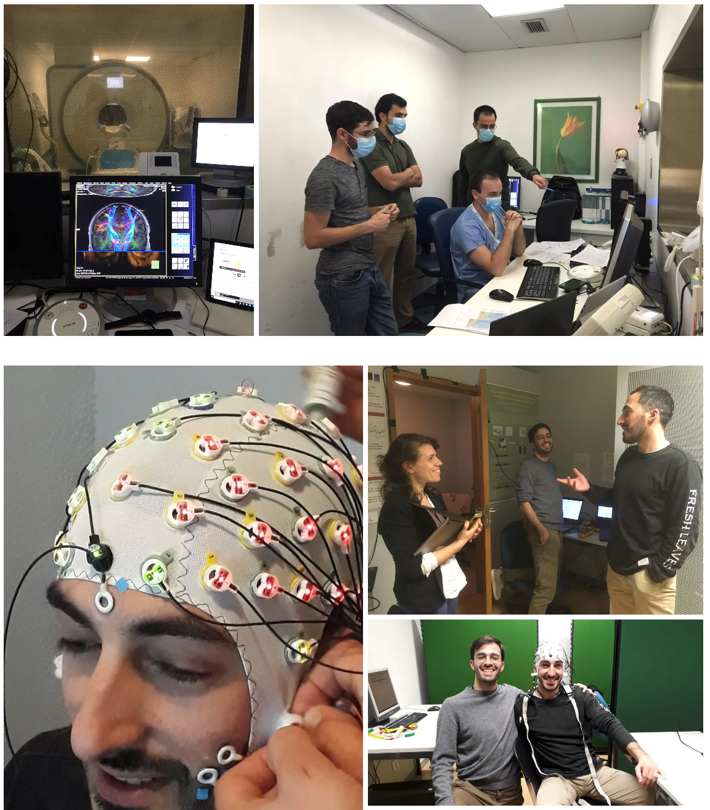
The Neurobiology of Social Cognition
Understanding the neurochemistry and circuitry mediating social cognition is key to treat a large range of neuropsychiatric disorders – as social deficits are often present at their origin and often do not subside with treatment. We study healthy humans, and individuals with psychiatric conditions, with structural and functional neuroimaging (MRI and DTI), eye-tracking, pupilometry, skin conductance, EEG, ECG, genetic and proteomic testing and computational modelling – in double blind placebo-controlled pharmacological administration using psychological stimuli in a range of social cognition tasks including naturalistic contexts such as social dance.
What do we do? genetics, neuropharmacology, neuroimaging, psychophysiology, reinforcement learning, social cognition, emotion recognition
Collaborations with: King’s College London (UK), Emory University (USA), IST (Portugal), ISCTE (Portugal), Champalimaud Neuroscience (Portugal), ISPA (Portugal), and The Netherlands Institute for Neuroscience (The Netherlands), NIMH (USA)
Interested in knowing more about this topic? Contact people: Diana Prata
Accepting internships, Masters and PhDs!
Multimodal biomarkers to predict the onset and prognosis of neuropsychiatric illnesses
Psychiatry and, to a lesser extent, neurology are still fields of medicine that take very little advantage of quantitative, biological and objective measurements – with a lot of trial-and-error and one-size-fits-all therapeutics. We develop pattern recognition algorithms that can statistically predict the level of personalized risk of each new patient. To train these algorithms, we use pre-existing samples (free online or our own) containing neuroimaging and also genetic, psychological, environmental and clinical data.
What do we do? genetics, neuroimaging, clinical biomarkers, recognition algorithms
Collaborations with: King’s College London (UK), Radboud University Nijmegen (The Netherlands), University College London (UK), University of Munich (Germany)
Interested in knowing more about this topic? Contact people: Diana Prata
Accepting internships, Masters and PhDs!
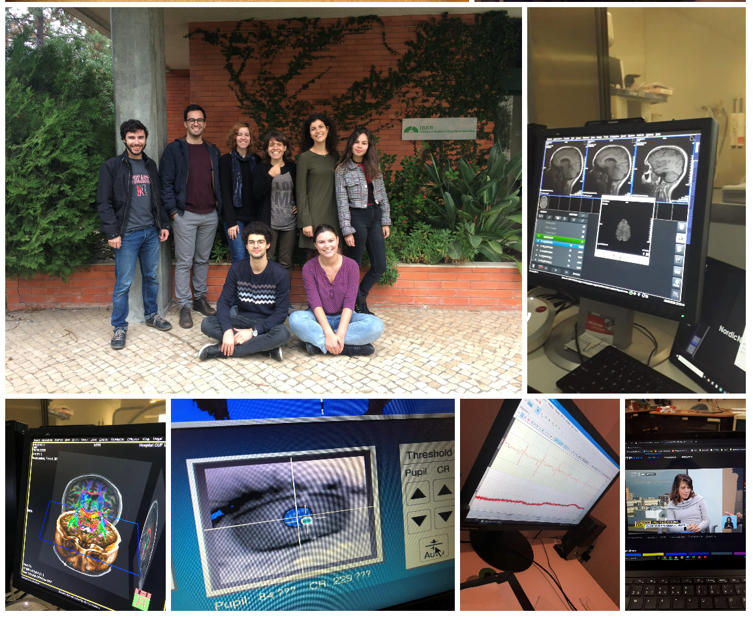
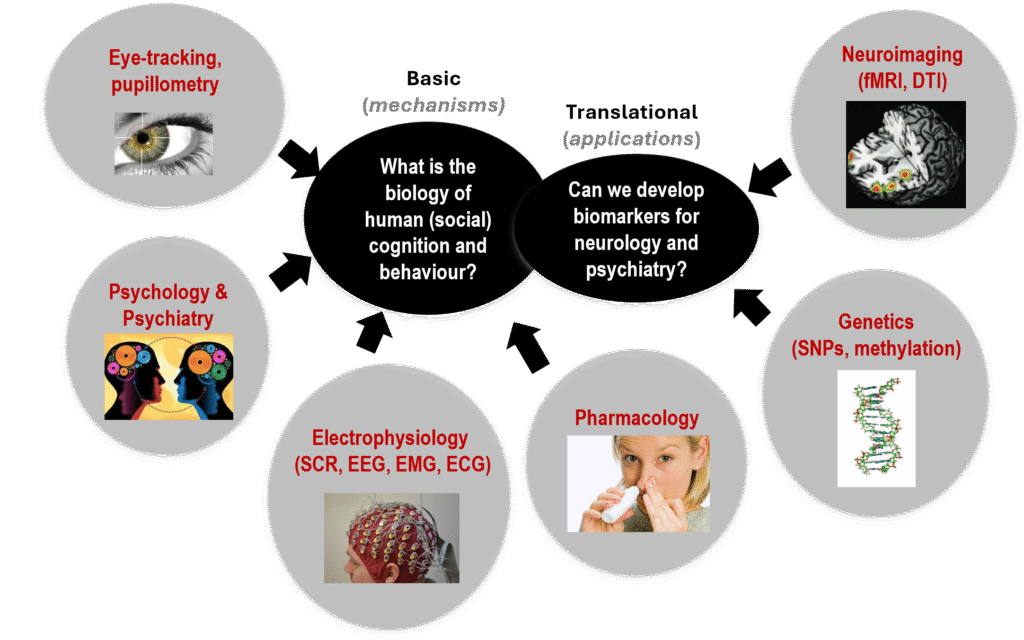
Genetic underpinnings of human brain function and structure
Several aspects of brain function and structure are known to be highly heritable but little is known about what specific genes contribute to them. For example, while specific genetic variations have been associated with cognitive abilities and susceptibility to many psychiatric illnesses, we still do not know how they operate or increase risk. We use existing databases of controls and bipolar disorder and schizophrenia patients, in whom MRI data (functional and structural MRI, Positron Emission Tomography (PET) and Diffusion Tensor Imaging –DTI) and genotyping (including genome-wide GWA) human data has been collected, to correlate genetic with neuroimaging measurements in healthy humans, and patients with schizophrenia and bipolar disorder.
What do we do? genetics, neuroimaging, brain connectivity, dopamine synthesis, fMRI, sMRI, DTI, PET.
Collaborations with: King’s College London (UK), University College London (UK)
Interested in knowing more about this topic? Contact people: Diana Prata
Accepting internships, Masters and PhDs!
NOISyS: Neuroadaptive Systems for Brain Restoration Using VR and BCI
This project explores how combining virtual reality (VR) and brain-computer interfaces (BCI) can create inclusive rehabilitation systems for motor and cognitive recovery. It focuses on using neuroimaging and neural markers to adapt VR training to patient needs.
What do we do? virtual reality, brain-computer interfaces
Collaborations with: Instituto Superior Técnico (Portugal), Hospital da Luz de Lisboa (Portugal), Centro de Medicina de Reabilitação de Alcoitão (Portugal), Instituto Politécnico de Setúbal (Portugal)
Interested in knowing more about this topic? Contact people: Anna Lethournel
Accepting Masters!
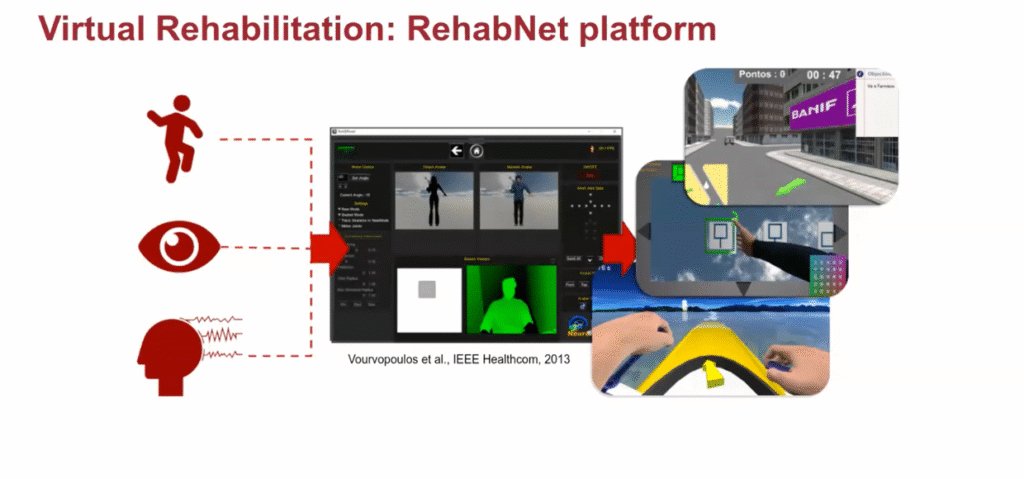
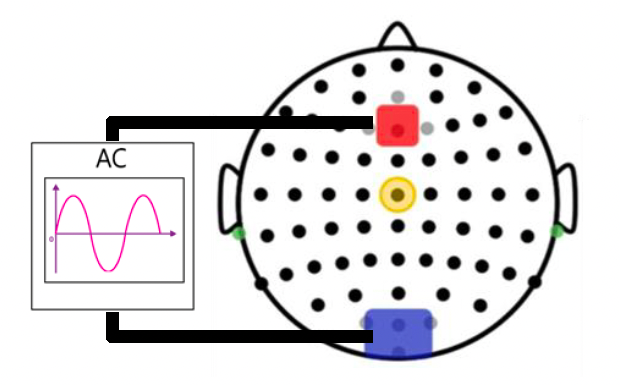
Stim4Dex: Transcranial Electrical Stimulation for Fine Motor Recovery in Neurological Conditions
This project investigates how transcranial electrical stimulation (tES) can modulate sensorimotor networks to restore fine motor skills in Parkinson’s disease (PD). It combines neurophysiological assessment through EEG and EMG with personalized stimulation protocols.
What do we do? transcranial direct current stimulation (tDCS), EEG, EMG
Interested in knowing more about this topic? Contact people: Anna Lethournel, Sofia Fernandes
Accepting internships and Masters!



